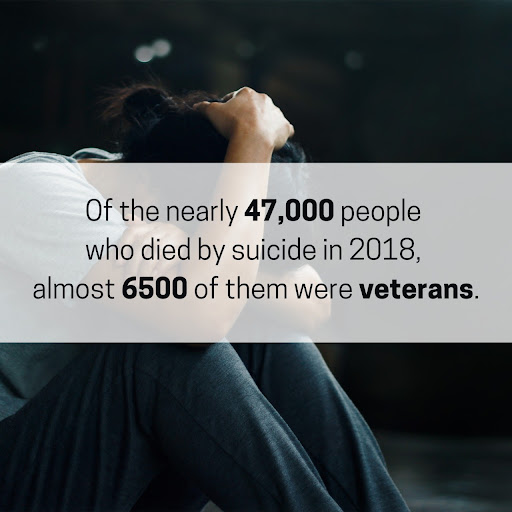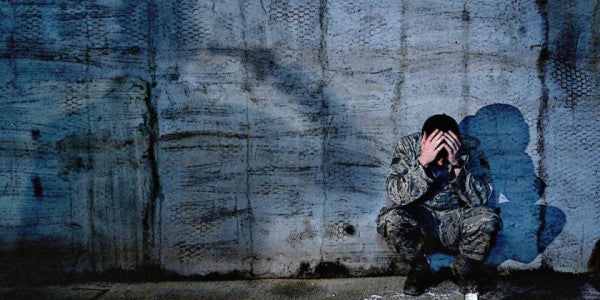How Many Veteran Suicides Happen Every Day, and What Can We Do About It?
The veteran suicide rate is alarming: the VA (Veteran Administration) estimates, in a report released in 2020, that 6,435 veterans died by suicide in 2018. More veterans die by suicide than than we lose from combat. We are losing 6.500 veteran lives each year to suicide compared to 1,250 per year in active duty combat deaths.
Active duty personnel also face a suicide risk that is deeply concerning. In the 15 years between 2006 and 2021 36% of all non accident deaths and 24% of all deaths were due to suicide.
This tragic loss of life is a complex issue with many different facets. Mental health issues are one obvious contributor to the high rate of veteran suicide, and as mental health providers, we’re committed to doing anything we can to reduce the suffering that veterans go through.
TMS therapy is an effective and safe treatment for depression, and could help more veterans to recover from mental health issues and start living the happy lives they deserve.
Veteran Suicidality Rate: Taking a Look at the Alarming Numbers

- Of the nearly 47,000 people who died by suicide in 2018, almost 6500 of them were veterans.
- 5 times as many veterans die from suicide as from combat injuries.
- We lost 17 veterans to suicide every day in 2018.
- The veteran suicide rate compared to the general population has increased. Veterans are now 1.5 times more likely than a Suicide rates are lower in Black veterans than in white veterans.
- Young male veterans, between the ages of 18 and 34, are the most at risk compared with civilians in the same age group.
- In terms of sheer numbers, there were more veterans aged 55 to 74 who died by suicide in 2018 (over 2500) than in any other age group.
- Suicide rates are higher for veterans and military members who are separated or divorced than those who have never been married. Married veterans are the least likely to die by suicide.
- Having a mental illness or substance use disorder put veterans much more at risk for dying by suicide than veterans without these issues. Having opioid use disorder or bipolar disorder, specifically, increases their risk.
Why Are Veteran Suicide Rates so High?
It’s no secret that serving in the military is hard on your mental health, and many veterans find that their mental health deteriorates even more after they leave the structure of the military. That’s partially why the Veteran Administration has listed suicide prevention as their number one clinical priority. As the numbers make clear, this is a mental health emergency.
But veterans are hardly the only people who struggle with mental health issues. Although veterans are more likely, overall, to die by suicide, the number of civilians we lose to suicide every day is tragic, too. It turns out that many of the reasons why veterans are suicidal are the same difficulties that the civilians are facing: depression, hopelessness, and loneliness.
And many veterans and military members, when asked, list multiple reasons for wanting to commit suicide 一 which tells us that this is a complex issue which can’t be reduced into a black-and-white list. Unfortunately, there are multiple factors contributing to this problem; there isn’t one magical solution that can fix it.
More research is needed to know for sure why, exactly, veterans are dying by suicide at such high numbers. But experts think that some of the things that might contribute to the phenomenon might be:
A desire to escape intense emotional distress.
Researchers in one small-scale study talked to 72 soldiers who tried to kill themselves to learn more about their reasons. They found that the number one reason that the soldiers identified, out of the 33 reasons that were provided, was a desire to end the psychological pain they were facing.
Mental health problems.
Around a third of military personnel have a mental health diagnosis like post-traumatic stress disorder, depression, bipolar disorder, or substance use disorder. These diagnoses make anyone much more likely to die by suicide. Only 50% of returning veterans receive the mental health treatment they need.
Homelessness and other financial difficulties.
Sadly, many veterans aren’t taken care of when they return to civilian life. They may find that they aren’t able to find ways to apply their military skills to civilian jobs. Mental health and substance abuse issues may compound these hardships. Over 37,000 veterans are currently homeless.
Being marginalized for their sexuality.
Veterans who identify as a member of the LGBTQ+ community are at higher risk for post-traumatic stress disorder, depression, alcohol abuse, and suicidal thoughts.
Social isolation and loneliness.
Social isolation is a risk factor for suicide for anyone, not only veterans. And the research shows that veterans who are married are much less likely to die by suicide than those who are divorced, separated, or single.
Traumatic brain injury and other health conditions.
Studies have found that veterans who have died by suicide are more likely to have a chronic health condition like traumatic brain injury, a sleep disorder, or chronic pain. These disorders are linked to a higher suicide risk in the civilian population, as well.
Combat trauma.
The evidence is inconsistent on whether or not going to combat increases a veteran’s risk for suicide. Some studies found that it does, but others find that it doesn’t seem to matter whether or not a veteran had been deployed.
Veteran Suicide Prevention Methods: What Can We Do?
Preventing veteran suicides is an enormous task that will likely require the cooperation of different organizations on a national level.
As mental health treatment providers, we’d like to do our part in making sure that our nation’s veterans are cared for. Transcranial magnetic stimulation, or TMS therapy, is an innovative, safe, and effective treatment for stubborn depression symptoms that just won’t go away with therapy and medication.
If you’re a veteran and are struggling with depression, give us a call to see what we might be able to do for you. 70% of people with treatment-resistant depression find relief with TMS therapy. Many people with substance use disorder and bipolar depression have also been helped with TMS. There is a happy and fulfilling life waiting for you beyond these suicidal feelings.
If you are having feelings of harming yourself or ending your life, call 1-800-273-8255. Veterans can call the Veteran Crisis Line at 1-800-273-8255 or text 838255 to be connected with confidential support.






